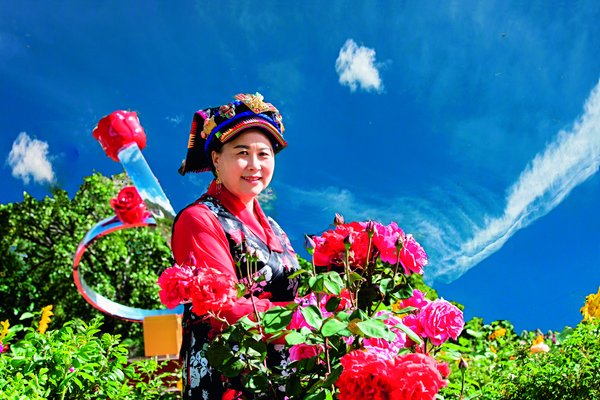'Sister Rose' Leads Villagers to Better Lives
 |
| Chen Wanghui |
Maoshui Village, in Xiaojin County, Aba Tibet and Qiang Autonomous Prefecture, in Southwest China's Sichuan Province, is located at the foot of Jiajin Mountain. As the first snow-covered mountain the Red Army crossed during the Long March, in the 1930s, Jiajin is a sacred mountain in the hearts of locals.
Chen Wanghui moved to the village after she married one of the villagers in the 1990s. At that time, she borrowed some money to open a noodle restaurant. Three years later, she established a hotel, and her family life was greatly improved.
Chen became a CPC member in 2008. Two years later, she was elected village head. Since then, she has helped villagers escape poverty and live better lives.
Many wild boars destroyed villagers' crops. In May 2011, coincidentally, Chen saw a rose in a field of ruined crops. "It seemed the wild boars were scared of the thorns of the rose plants. 'What if we plant roses? Will it be profitable?'" Chen wondered. She eventually visited seven provinces to inspect the rose-planting and-processing industries.
In 2013, she bought rose seeds, and she distributed them among the villagers, for free. As the villagers were not initially interested in planting roses, the survival rate of the roses was very low that year. The village's rose market was stagnant the following year. Fearing the villagers would lose money, Chen bought their roses for 40 percent above the average market price.
"The villagers saw hope. I also established a cooperative and signed a contract with them. I will buy their roses each year, and the minimum purchase price will be three times the price of conventional crops," Chen says.
As the cost of processing roses out of the province was high, Chen raised more than 17 million yuan (US $2.42 million) to establish a standardized factory in the village.
The factory processes roses and sells various products. The cooperative is responsible for organizing training, buying roses, and breeding and distributing seeds and rose bushes. The villagers only have to worry about planting and taking care of and harvesting the roses. Women and seniors have obtained confidence and increased incomes by planting and harvesting roses.
At present, 38 villages in 12 towns or townships in the county have rose-planting industries, and their combined rose fields cover 8.37 square kilometers. Planting and harvesting roses benefit more than 1,100 impoverished families, and more than 400 families with disabled members.
Chen was elected secretary of the village Party branch in 2016. In 2019, she received the National Poverty-Alleviation Award for her efforts to lift villagers out of poverty. She is referred to as "Sister Rose" in the village. "When I pay the villagers to buy their roses, I can see their smiles. That makes me happy and proud," Chen says.
Photo supplied by Fan Wenjun
(Women of China English Monthly March 2020 issue)
Please understand that womenofchina.cn,a non-profit, information-communication website, cannot reach every writer before using articles and images. For copyright issues, please contact us by emailing: website@womenofchina.cn. The articles published and opinions expressed on this website represent the opinions of writers and are not necessarily shared by womenofchina.cn.

 京公网安备 11010102004314号
京公网安备 11010102004314号